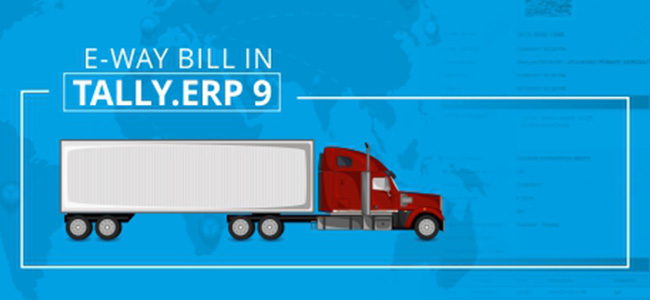The major GST recommendations with regards to the e-way bill notifications are as follows:
The nationwide e-way bill system will be rolled out on a trial basis, latest by 16th January, 2018, post which traders and transporters can start using this system on a voluntary basis.
The detailed rules for implementation of the nationwide e-way bill system for inter-State movement of goods on a compulsory basis will be notified with effect from 1st February, 2018.
While the system to generate both inter-State and intra-State e-way bill will be ready by 16th January, 2018, the States may choose their own timings for implementation of e-way bill for intra-State movement of goods on any date before 1st June, 2018. However, since there are certain States which are already having a system of e-way bill for intra-State as well as inter-State movement of goods, they may be expected to be the early adopters of the national e-way bill system for intra-State movement also.
The final deadline to implement the uniform system of e-way bill for inter-State as well as intra-State movement across the country will be, the 1st of June, 2018
Electronic Way Bill
E-Way Bill is basically a compliance mechanism wherein by way of a digital interface the person causing the movement of goods uploads the relevant information prior to the commencement of movement of goods and generates e-way bill on the GST portal. Rule 138 of the CGST Rules, 2017 provides for the e-way bill mechanism and in this context it is important to note that “information is to be furnished prior to the commencement of movement of goods” and “is to be issued whether the movement is in relation to a supply or for reasons other than supply”
E-Way Bill under GST
E-way bill is an electronic document generated on the GST portal evidencing movement of goods. It has two Components-Part A comprising of details of GSTIN of recipient, place of delivery (PIN Code), invoice or challan number and date, value of goods, HSN code, transport document number (Goods Receipt Number or Railway Receipt Number or Airway Bill Number or Bill of Lading Number) and reasons for transportation; and Part B comprising of transporter details (Vehicle number). As per Rule 138 of the CGST Rules, 2017, every registered person who causes movement of goods (which may not necessarily be on account of supply) of consignment value more than Rs. 50000/- is required to furnish above mentioned information in part A of e-way bill. The part B containing transport details helps in generation of e-way bill.
Who should generate the e-way bill and why?
E-way bill is to be generated by the consignor or consignee himself if the transportation is being done in own/hired conveyance or by railways by air or by Vessel. If the goods are handed over to a transporter for transportation by road, E-way bill is to be generated by the Transporter. Where neither the consignor nor consignee generates the e-way bill and the value of goods is more than Rs.50,000/- it shall be the responsibility of the transporter to generate it. Further, it has been provided that where goods are sent by a principal located in one State to a job worker located in any other State, the e-way bill shall be generated by the principal irrespective of the value of the consignment. Also, where handicraft goods are transported from one State to another by a person who has been exempted from the requirement of obtaining registration, the e-way bill shall be generated by the said person irrespective of the value of the consignment.
Purpose of E-Way Bill
E-way bill is a mechanism to ensure that goods being transported comply with the GST Law and is an effective tool to track movement of goods and check tax evasion.
How is it generated?
An e-way bill contains two parts- Part A to be furnished by the person who is causing movement of goods of consignment value exceeding Rs.50,000/- and part B (transport details) to be furnished by the person who is transporting the goods. Where the goods are transported by a registered person whether as consignor or recipient, the said person shall have to generate the e-way bill by furnishing information in part B on the GST common portal. Where the e-way bill is not generated by registered person and the goods are handed over to the transporter for transportation by road, the registered person shall furnish the information relating to the transporter in Part B of FORM GST EWB-01 on the common portal and the e-way bill shall be generated by the transporter on the said portal on the basis of the information furnished by the registered person in Part A of FORM GST EWB-01
Validity of E-Way Bill
The validity of e-way bill depends on the distance to be travelled by the goods. For a distance of less than 100 Km the e-way bill will be valid for a day from the relevant date. For every 100 Km thereafter, the validity will be additional one day from the relevant date. The “relevant date” shall mean the date on which the e-way bill has been generated and the period of validity shall be counted from the time at which the e-way bill has been generated and each day shall be counted as twenty-four hours. In general, the validity of the e-way bill cannot be extended. However, Commissioner may extend the validity period only by way of issue of notification for certain categories of goods which shall be specified later. Further, if under circumstances of an exceptional nature, the goods cannot be transported within the validity period of the e-way bill, the transporter may generate another e-way bill after updating the details in Part B of FORM GST EWB-01.
Cancellation of E-Way Bill
Where an e-way bill has been generated under this rule, but goods are either not transported or are not transported as per the details furnished in the e-way bill, the e-way bill may be canceled electronically on the common portal, either directly or through a Facilitation Centre notified by the Commissioner, within 24 hours of generation of the e-way bill. However, an e-way bill cannot be canceled if it has been verified in transit in accordance with the provisions of rule 138B of the CGST Rules, 2017 .The facility of generation and cancellation of e-way bill will also be made available through SMS.
Exceptions to e-way bill requirement
No e-way bill is required to be generated in the following cases
- Transport of goods as specified in Annexure to Rule 138 of the CGST Rules, 2017
- Goods being transported by a non-motorized conveyance
- Goods being transported from the port, airport, air cargo complex and land customs station to an inland container depot or a container freight station for clearance by Customs
- In respect of movement of goods within such areas as are notified under rule 138(14) (d) of the SGST Rules, 2017 of the concerned State
- onsignment value less than Rs. 50,000/-
E-Way Bill in Tally ERP9
E-Way Bill need to be generated on E-Way Bill portal. Development and process in Tally regarding E-Way bill is under process very soon it will be available in Tally ERP.9
Upcoming Tally.ERP 9 Release 6.4 will make e-Way Bill management simpler.
Where to generate E-Way Bill
https://services.gst.gov.in/services/ewaybill/ewaybillsystem


